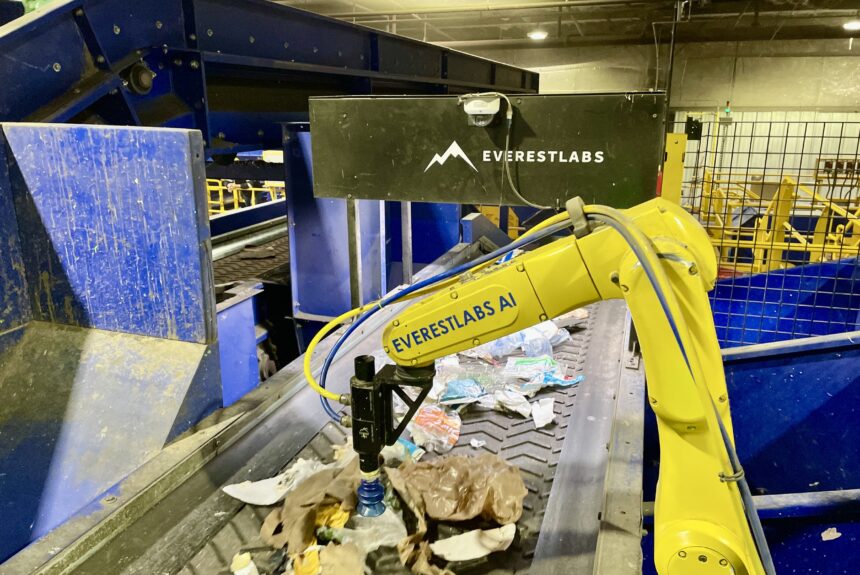Recycling rates across the U.S. are dismal and the results of its environmental effectiveness are mixed. According to the Global Waste Index, just 23.4% of waste in the U.S. is recycled, placing the country among the worst performers globally, especially when considering its status as one of the leading waste producers. The U.S. generates more trash per capita than any other nation, with an average of just under 1,800 pounds per person. The private sector is stepping up to help by improving waste management practices.
>>>READ: Scientists Create Backyard-Compostable Bioplastic from Algae
Several companies are devising innovative ways to tackle the growing waste problem.
One company attempting to transform the complicated business of waste sorting is California-based Everest Labs. The company’s signature AI-powered robotics solution for recycling facilities, RecycleOS, can accurately characterize different kinds of recoverable content and sort them into their respective bunkers. The platform is supported by 3D-depth sensing cameras (which Everest calls its “vision system”) that are positioned over conveyors to capture a live audit of the recycling stream. Once a 3D image is captured, it is processed and analyzed in real-time by high-speed AI algorithms.
The AI software is remarkably accurate; the company claims that it can translate images into 50+ classes of objects with greater than 95 percent accuracy within 15 milliseconds. Everest Labs accomplishes this remarkable feat by using a proprietary dataset of more than 4 billion recyclable objects to train its advanced neural network. And like many modern AI systems, the robotic sorting technology is both adaptive and capable of self-learning. It becomes more efficient at waste sorting the longer it operates and is continuously updated to handle changing belt conditions and material types.
“Our AI provides accurate data on the shape, size, weight, material, packaging type, commodity value, and even brand information of every recyclable flowing through the plant,” JD Ambati, founder and CEO of EverestLabs, told Forbes.
The result is an AI-driven data and digitized solution that addresses the core challenge of the material recovery process: sortation.
To date, sortation is handled by human workers, not immune to making faults and certainly not as quick as AI-enabled robotic arms. Whereas the average human worker can pick 20 to 40 objects per minute (depending on the material) from a fast-moving conveyor belt, their AI-enhanced counterparts can sort items significantly faster—and with higher precision.
>>>READ: Can this Plastic-Eating Mold Help Solve the Plastic Pollution Challenge?
“Because of AI, because of the robotic arms, we have seen plants recover 10, 20, 30% more than what they have been doing previously,” Ambati says. “They have been losing millions of dollars to the landfill, and because of AI, they were able to identify the value of the losses and deploy robotic arms to capture that.”
Indeed, this is good news for labor-strapped plant operators. When Everest Labs implemented the software for a client in the San Francisco Bay area, ACI, the customer saw a 59 percent decrease in labor costs.
Not only is it advantageous for business, but RecycleOS also frees up human labor so that sorters can work on more engaging tasks. Everest states that although the robots involve an initial investment, the cost is recouped in under six months thanks to savings from greater material recovery, lower landfill fees, reduced employee turnover, decreased training expenses, and fewer injuries.
Up to 30 percent of all items sent to recycling facilities still end up in landfills. By overcoming the traditional limitations of the waste management industry—particularly labor challenges and the key issue of sortation—Everest Labs’s automated solution for recycling facilities is a testament to the power of the circular economy.
Nathalie Voit is a freelance content creator and a graduate of the University of Florida. She is an alumni of The Heritage Foundation’s Young Leaders Program.
The views and opinions expressed are those of the author’s and do not necessarily reflect the official policy or position of C3.
